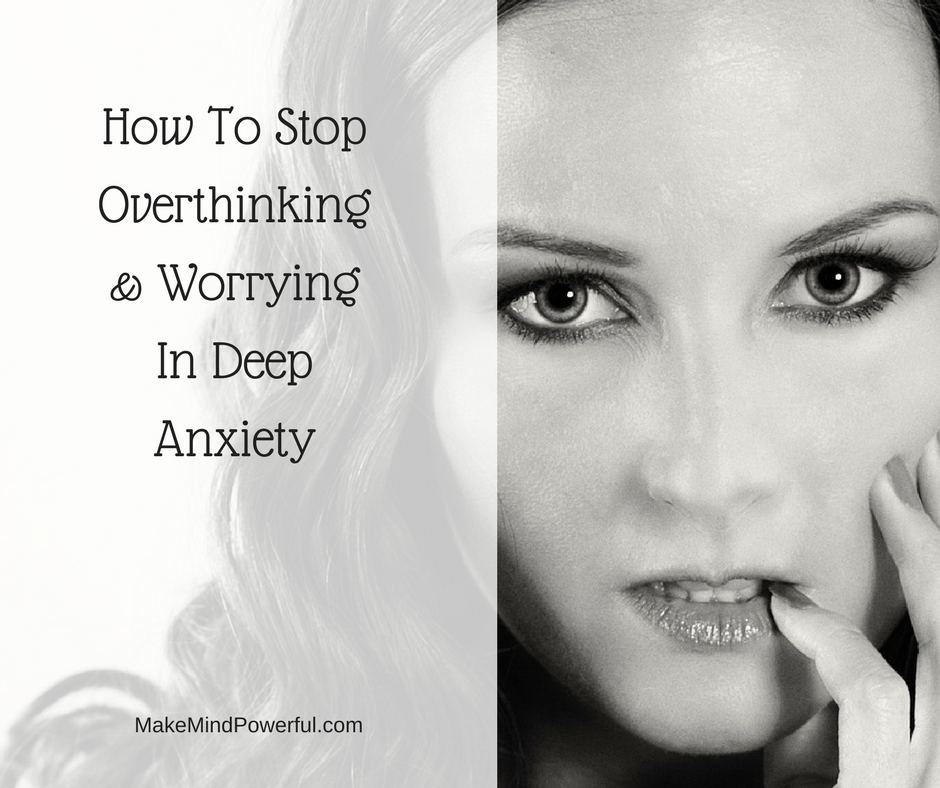How to stop worrying about the future? It’s amazing how sometimes our mind tends to scare itself into madness with self-talk. Think about your last failed job interview, or screwing up in a presentation. Does your mind goes “I’ve just ruined my future“, “I’ll probably fail again, so why don’t I just quit“, or “I must look like a total fool“. And if you’re suffering from anxiety, those overthinking could just ramp up on turbo mode, and within minutes, you felt like the biggest loser on earth.
I used to suffer from deep anxiety in the past, and even have short bouts of it at times now. Articles and friendly advice that suggested you to “think positive” or “don’t be such a pessimist” often backfire. Can you relate? When it comes to stopping overthinking and excessive worrying, it’s much more than reading a few self-help books and hoping that your mind will stop behaving in a destructive way. It is going to take more than intellectual understanding to snap out of it.
Recommended: 9 Psychological Social Anxiety Disorder Symptoms You May Confuse For Introversion
Battling anxiety is not a single war that you could win overnight but a series of battles that only make you stronger if you know how to. I’ve had my fair share of issues with anxiety for the past 15 years. These by far are the most effective methods for me to stop overthinking and worrying when anxiety struck.
How To Stop Overthinking And Worrying (5 Techniques)
Let’s be clear that it’s impossible to eliminate all form of worrying and overthinking. In fact, a healthy amount of worrying is actually good for you. It’s only when chronic worrying paralyzes your mind that you need to do something about it.
1. Break Your Thoughts Habit
We’re all creatures of habit. That means our action, speech and thoughts are all driven by habit. The condition that we grow in shapes up our early habits. Our social environment, workplace stress, and relationships define how we react. Sometimes, certain thought habits could be born out of traumatic incidences.
Habits are hard to break when we’ve been accustomed to it for years. Our thoughts happen so fast that it’s impossible to actively change the process there and then. But here’s one technique that I discovered unintentionally while I was going through Harv Eker’s course; the use of mantra.
It may sound funny and a far cry away from other techniques that you may have heard of but it works. I went through an online program by Harv Eker’s that changes the way we think about wealth. The point is, it requires us to recite mantras as our daily practice. Something like “I’m a spiritual millionaire” 5 times before each meal.
I was skeptical and dubious on what it hope to achieve initially. But after a couple of weeks doing, as requested, I find that it has an effect on my thought patterns. Where I normally would have negative reactions when things messed up, I found myself being aware of my thought intention, just a moment before being plunged into another bout of excessive worries.
Now, the key to this method is not the mantra. I personally do not believe that the mantra carries magical power, but the effectiveness of the process where you disrupt your routine thought habits so that it affects your other thought reaction as well.
2. Have A Worry Period And Create Positive Momentum
This is the contrary approach to “change your thoughts” or “think positive“. In reality, when you’ve gone through a long period of excessive worrying, you have pent up frustrations and negative energy that has to go somewhere. Think about a can of Coke that has been shaken and the built up pressure.
Set up an interval where you can worry and be obsessive with your thinking safely and comfortably. I personally enjoy my worry period in the comfort of my home. It doesn’t matter if it’s 30 minutes or a couple of hours. The key thing is to turn your negative energy of worrying into a huge momentum to propel you forward.
Here’s exactly what I do after my worry period that creates a powerful positive momentum. As soon as I finished obsessing, I start working on stuff that I worry about. If it’s about money, then I’ll start sending proposals and pitches for jobs. If it’s about health I go for a heavy workout routine.
It needs a slight nudge of discipline on your side to spark this awesome powerful momentum that will drown your worries in the coming few weeks. And because you take action after you allow yourself to worries, it is easier to do so. You’ll find that your mind automatically shrugs off any overthinking that comes along the way.
Do try it out the next time anxiety struck, and let me know if it works for you.
3. Set A Higher Goal And Purpose
When your only immediate goal is to stop your anxiety and get better, you’ll often fail. That’s because you focus all your effort on overcoming anxiety and nothing else. While it’s true that you have to take proactive effort in dealing with anxiety issues, obsessing with anxiety itself can develop into secondary anxiety.
This is personally true for me a few years ago, when I’m trying to battle both anxiety and depression after a divorce. You’ll lose sight of life in general and things often don’t get better. That change when I shifted my focus on a goal much wider than myself.
Try helping out on your local community projects. Some have noble goals like helping cancer patients. When you spent more time committed to making a better world for someone else, you’ll find that yours improve unknowingly. Or you could start a blog like this to help others with their anxiety.
If anxiety is represented physically, it could be a wound in our mind or some allergic rashes along the neuron pathway. It doesn’t get better if you keep rubbing it. When you have a physical wound, you don’t keep staring at it after applying medication.
So set a higher goal that’s bigger than yourself and touches others meaningfully in the process. Offer your best in volunteering for others. It heals emotionally, and also take off the stress of your daily job. You’ll have less time worrying when you’re working on meaningful higher purpose. Check out VolunteerMatch for opportunities nearby.
4. Relearn Your Behavior With Hypnosis
If you’re still trapped with the common misconceptions of hypnosis, read this. It is by far the best method that is both cost effective and efficient to bring calm to my mind almost immediately. As pointed out previously, our thoughts are formed by habits which have been developed over time.
Clinical hypnosis is a great method in changing our mind’s behavior and therefore our thoughts process. Recent developments have also seen hypnosis integrated with cognitive behavioral therapy(CBT) and have been proven more effective than CBT alone.
While hypnosis is generally safe, you’ll want to ensure that it’s effective and not some random hypnosis script read by an unknown voice on Youtube. It’s one thing using hypnosis for entertainment but when it comes to treating anxiety and giving you calm and clarity, experienced hypnotherapist is the best option.
I personally use hypnosis developed by a professional hypnotherapist for my social anxiety and it has been working wonderfully in dealing with a few relapse. Here’s an in-depth review of my experience with the particular hypnosis track.
While you may find you start to worrying less after a hypnosis session, it takes multiple consistent session to totally change your subconscious behavior. That said, hypnosis may not work for you if you have a very weak focus, as you may be drifting away from the suggestions from the hypnotists.
5. Practice Mindfulness
You may have heard of mindfulness as it has grown in popularity especially in Western countries. The root of mindfulness practice could be traced to 2,500 years ago in ancient Buddhism, but the secular form of mindfulness is found to be effective in treating anxiety.
Put it simply, mindfulness is a practice to detach ownership of your thoughts, especially negative thoughts that occur in excessive worrying. It encourages you to “live in the present” by not getting carried away with worries and regrets.
It is not some magical drugs that could stop your worries and anxiety overnight, but a practice that must be cultivated consistently for the benefits to show. The best way to get started with mindfulness is still the formal practice of meditation.
However, meditating while you’re deep with worries can be almost impossible, and some people with anxiety gave up when they can’t seem to find the “calm zone”. Here are a few methods that help to meditate in anxiety.
These methods work for me, and I do believe it may work for some of you even if we experience anxiety differently. If you have other methods that help you to stop overthinking and worrying, feel free to leave your comment below.
Related :








Thank you for your site i look forward to practicing these steps i find all your information very positive and calming i tend to overthink and stress alot so for me its helpful.
Hi Audra,
Thanks for reading. I’m glad you find it helpful.
Cheers,
Kenny
Thank you, I have learnt so much from your post. I am guilty of “Overthinking” and the only person it affects more is me, I worry about family, have I said the right thing, what have I done to upset someone when I don’t hear from that person and before I know it I have a whole scenario and picture something that is not even reality! Reading your steps are uplifting and a positive way forward. Your points on how to “Practice mindfulness” and “Set a Higher Goal and Purpose” are exactly what I need. I very much look forward to exploring your post further and may even be able to help others.
Hi June,
We’re all guilty of overthinking at a certain point. The key step is to stop feeding our mind the energy that turn it into something obsessive.
Hope mindfulness help you in the long run.
Cheers,
Kenny
Informative article Kenny. No. 5 technique seems suits to me, mindfulness by meditation. Thank you! =)
Hi Christian,
Thanks for reading. Hope it helps.
Cheers,
Kenny
What a precious read, my friend!
Stopping overthinking and worrying is a fat problem to deal with, not to mention that things get complicated along the road and one could even worsen what he’s already going through by taking the wrong approach.
One would certainly need a roadmap to know how to deal with this destructive habit.
Allow me to state that your article is a perfect set of steps that can really help if one sticks with it.
I’ve personally been on with the third technique for a while know, and in my light anxiety case, it works perfectly!
I like to think something in the lines of “Hey, that’s normal, people mistake, it happens all the time, plus I should not let this little problem distract me from reaching my bigger goals”
It makes me feel more confident and less worried 🙂
Thank you for the good read, it’s much appreciated!
Hi,
Working on bigger goals often take our attention off our own problems. And it does get better eventually. I’m glad you found the same.
Keep it up!!
Cheers,
Kenny
Thanks for your thoughts here, this is a really useful article. I’ve more recently started taking a few minutes each day at work to practice mindfulness and just take some time to try and not think about anything. I’ve found it really difficult so far, I feel like my mind is always running no matter what. Do you have any recommendations on how to clear your mind to get more out of mindfulness?
Hi Craig,
Mindfulness is not really about clearing your mind. In fact when you attempt to “clear your mind” you’ll find that you’re stuck with them. It’s about being at peace with your thoughts.
Cheers,
Kenny
Oh I can so relate this I have the same issue even when I am trying to sleep my brain doesn’t stop even with medication. I have tried talking to doctors but they seem to just be like try this and try this so yes I will try the book and see. I think your post is wonderful there are so many people facing this its unreal I think part of it is the world we live in.
Than you so much for this wonderful information
Jessica
Hi Jessica,
Technically we can’t stop our brain for thinking but we can learn to be at peace with the thoughts. I hope this help.
Thanks.
Cheers,
Kenny
When i first saw the headline I said to my self hey no way, and i must admit after reading your article over and over again and bringing into my situation I still maintain my earlier stand.
With bunch of things to worry about from business gone bad to family troubles down to things generally not going your way, it is practically not possible to just read some pieces of well constructed articles and assum your worries which is the primary cause of overthinking would be gone, atleast not with me.
But on a secomnd thought, as they said there is no harm in trying and so i am going to try and train my mind with your suggested 5 Techniques.
Thanks for your help, Kenny.
Hi,
Intellectual understanding does not really help in managing anxiety. I used to run my own business too so I know where you’re coming from.
You can read hundreds of articles like mine but it really takes pro-active action on our part to train our mind.
Hope it helps.
Cheers,
Kenny
What a great article, very nicely done and organized. I especially like the E-book offer you are giving away.
I can relate to those you speak of, that’s why I started my site to help beat anxiety in a different form. I’ve always been interested in cognitive therapy, reading your article makes me want to try it.
Hi Dawna,
I’m glad you’re helping others as you fight your own anxiety.
Cheers,
Kenny
Easy to say, but hard to do. We really do not have the ability to control our thoughts. It seems to me that only a change in the economic situation for the better can cause the thoughts to disappear
Hi Daniel,
It’s definitely not easy when it comes to mastering our mind. As with any skill, it takes time and tremendous effort. Well, a better economy does help though 🙂
Cheers,
Kenny
I couldn’t agree more with the concept of trying live in the here and now. Too often I think a lot of people and myself included get caught up with what may happen instead of focusing what is in front of them that they can control. If you think too much about what may happen in the future it paralizes you in the present.
Hi Chris,
Living mindfully is key in keeping our mind free from unnecessary worries.
Cheers,
Kenny
Hello Kenny – Thanks for this excellent article I’m a person who used to overthink a lot and due to this I’m unable to make right decisions . My overthinking goes to an extent that I will analyze all the positive and negative things in a situation and which ultimately keeps me dragging from decision making. Thanks for this post and from this I’m planning to go with first on meditation as most of my friends suggested the same for me after which I will proceed with the rest mentioned in the article. Once again thanks for helping.
Hi Manasir,
I’m glad this article helps you. Hope meditation can help you in your struggle.
Cheers,
Kenny